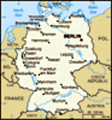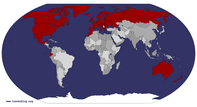Advertisement
Published: June 16th 2016
On November 8, 1895, a 50 year old German physicist was experimenting with Crookes tubes (evacuated globes with a cathode and an electrode between which a current can be passed). He was primarily interested in the light produced, but when he covered the tube with sturdy paper he noted that a platinobarium screen 9 feet away glowed, a result he had not predicted. He immediately recognized that he had discovered a new type of rays, which he called x-rays (for "x" the "unknown".) Over 7 weeks he performed meticulous experiments and began to define the properties of the new rays, including the ability to pass through human tissue and outline bones and metal. In 1901, his work was recognized with the awarding of the first Nobel Prize in physics. His discovery was adopted into use with unusual alacrity for applications as useful as x-raying fractures and as ridiculous as for tracking spousal indiscretions. In fact, the use of the rays spawned a side industry of items such as lead underwear to foil x-ray glasses from seeing private parts (my understanding is that these are making a comeback in North Carolina). Thomas Edison began experimenting and produced fluoroscopes. Within a short time,
users began to report skin burns and other problems associated with exposure to the rays, and Edison's assistant in the fluoroscope experiments died from skin cancer. But the technology continued to be used frivolously well into the 1950's, when children like myself used to put our feet into the Buster Brown machine to use the x-rays to see if our shoes fit properly. We consider Prof. Roentgen to be the sponsor of our trip. Today we visited his lab in Wurzburg where he made the discoveries. It was spared during the bombing of Wurzburg in World War II, and many of his experimental apparatus have been preserved.
Earlier in its history, Nuremberg (Nürnberg) was important for its role as the "unofficial capital of the Holy Roman Empire". In Charles IV's Golden Bull of 1356, he decreed that Nuremberg would be the city where newly elected kings of Germany should hold their first Imperial Diet, making it one of the 3 most important cities in Europe. Although it frequently attempted neutrality, the city was washed over by the eddying currents of various wars, usually to its disadvantage. Pre-shadowing future events, it was the site of several pogroms against
the Jewish population. During the Nazi years, Nuremberg became the center of Nazi propaganda, with huge rallies held there nearly annually. Unfortunately for the city, it also was a central city for production of military goods such as tank engines, aircraft, and submarine parts, and for that reason as well as propaganda reasons, it was largely destroyed by Allied bombing during World War II, and what now exists is mostly reconstructed. The Palace of Justice, however, was preserved, and as a deliberate affront to any remaining Nazis it was used as the site of the first war trials. The trials to be held by the Allies had only a single phase because the Cold War intervened. That first wave included the trials of 23 of the most important war criminals. Of these 12 were convicted and sentenced to death by hanging. 10 were hanged, one had been killed trying to escape Berlin (Martin Bormann) and Hermann Göring committed suicide the night before his hanging. The executioner was an American who had bungled previous hangings, and there were persistent rumors that many of the hanged men struggled for 14-28 minutes before finally succumbing. Many of those who were sentenced to long
prison sentences had their sentences commuted. There were allegations that the trials were not strictly fair, and the feeling against Nazis got lost in the anti-Communist sentiment in the Cold War. For those of us in medicine, the more important or at least better knows trials were the Doctors' Trials, conducted by the US alone. One of the three judges on the tribunal was Johnson C. Crawford of Ada, OK. Some of the doctors were condemned to death , some acquitted , and some to long prison sentences. The most notorious of them, Josef Mengele, escaped to Argentina and drowned when he had a stroke while swimming in 1979. These Doctors' Trials resulted in the Nuremberg Code which established a set of research ethics for human experimentation.
One of the most important aspects of the Nuremberg Trials is that they set tip a mechanism in which persons could be tried for crimes against humanity and for war crimes by international bodies. Furthermore, out of the whole process came the following set of Nuremberg Principles, adopted by the United Nations:
Principle I
"Any person who commits an act which constitutes a
crime under international law is responsible therefore and liable to
punishment."
Principle II
"The fact that
internal law does not impose a penalty for an act which constitutes a crime under
international law does not relieve the person who committed the act from responsibility under international law."
Principle III
"The fact that a person who committed an act which constitutes a crime under international law acted as
Head of State or
responsible government official does not relieve him from responsibility under international law."
Principle IV
"The fact that a person acted pursuant to order of his Government or of a superior does not relieve him from responsibility under international law, provided a moral choice was in fact possible to him".
This principle could be paraphrased as follows: "It is not an acceptable excuse to say 'I was just following my superior's orders'".
Previous to the time of the
Nuremberg Trials, this excuse was known in common parlance as "
Superior Orders". After the prominent, high profile event of the Nuremberg Trials, that excuse is now referred to by many as the "
Nuremberg Defense". In recent times, a third term, "
lawful orders" has become common parlance for some people. All three terms are in use today, and they all have slightly
different nuances of meaning, depending on the context in which they are used.
Nuremberg Principle IV is legally supported by the
jurisprudence found in
certain articles in the Universal Declaration of Human Rights which deal indirectly with conscientious objection. It is also supported by
the principles found in paragraph 171 of the Handbook on Procedures and Criteria for Determining Refugee Status which was issued by the Office of the
United Nations High Commissioner for Refugees (UNHCR). Those principles deal with the conditions under which
conscientious objectors can apply for refugee status in another country if they face persecution in their own country for refusing to participate in an illegal war.
Principle V
"Any person charged with a crime under international law has the
right to a fair trial on the facts and law."
Principle VI"The crimes hereinafter set out are punishable as crimes under international law:
(a)
Crimes against peace:
(i) Planning, preparation, initiation or waging of a
war of aggression or a war in violation of international treaties, agreements or assurances;(ii) Participation in a common plan or conspiracy for the accomplishment of any of the acts mentioned under (i).
(b)
War crimes:
Violations of the
laws or customs of war which include, but are not limited to,
murder, ill-treatment or
deportation to
slave labor or for any other purpose of
civilian population of or in
occupied territory; murder or ill-treatment of
prisoners of war or
persons on the Seas, killing of
hostages,
plunder of
public or
private property, wanton destruction of
cities,
towns, or
villages, or devastation not justified by
military necessity.
(c)
Crimes against humanity:
Murder, extermination, enslavement,
deportation and other inhumane acts done against any civilian population, or
persecutions on political, racial, or religious grounds, when such acts are done or such persecutions are carried on in execution of or in connection with any crime against peace or any war crime."
Principle VII
"Complicity in the commission of a crime against peace, a war crime, or a crime against humanity as set forth in Principle VI is a crime under international law."
The United States help draft these principles. We should remember that then we have politicians who propose committing war crimes and would justify it as being okay because they were the head of state.
Our visit to the Palace of Justice and Courtroom 600 gave us a much clearer view of the events
Advertisement
Tot: 0.342s; Tpl: 0.012s; cc: 20; qc: 42; dbt: 0.0917s; 1; m:domysql w:travelblog (10.17.0.13); sld: 1;
; mem: 1.2mb










